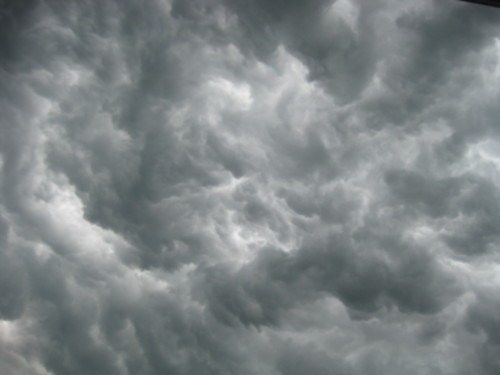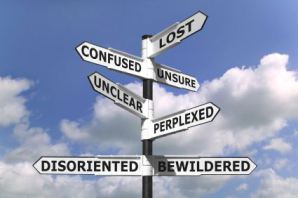July 2013
This Month's Contents: An Art of Unknowing by Ally Milo | Excerpt: Monsieur Monde Vanishes by Georges Simenon | What is Enough? by Topi Piirainen | Message by Eloratea | Audio: Riders On the Storm by The Doors | Quotes | Humor | Reader Commentary |
Editor's Note
by David Weimer
Richard Rose said, “When I close my eyes, the sun disappears,” and, “The dinosaurs didn't need to make any long term plans.”
I’ve listened to a lot of his recorded lectures over the years and some things stand out at times.
Recently, I heard a lady scientist arguing the case for a planetary defense system to protect us from future species-threatening asteroids and meteors. She quipped, “The dinosaurs are extinct because they didn’t have a very good space program.”
A few days ago, a good friend wrote to me that confronting the possible nonexistence of free will might lead to a permanent change of view. In Zen, and in Rose’s Albigen System, there is a strong emphasis on the necessity of ego death to precipitate Enlightenment.
Another acquaintance, a bookstore owner I see on a weekly basis, is dying. He has maybe a few months to live. With these things floating in my mind, I answered my friend briefly, “Yes…. Annihilation looms.”
Welcome to the Forum.
Editor’s note: Following this article, the author has included “an incomplete list of questions” they feel are important for all of us to consider and to discuss “amongst ourselves,” Enlightened or otherwise.
Next month’s TAT Forum will spotlight the responses to these questions, as well as readers’ reactions to this article. The author reminds us, “I don’t intend to leave the ‘UnEnlightened’ out of this discussion. I very much would like everyone to think on these issues.”
An Art of Unknowing
by Ally Milo
What don’t you know? Really.... Take a moment to sit with the question.
If you’re anything like me, perhaps your mind goes rather blank in response. I think this is part of the quality of awareness that a baby experiences – filled with possibility. You can see it in their eyes. Forever poised on the edge of knowing.
Some “when” along the way we trade delight and wonder’s non-identity, the stuff of interaction and play, for an identity of presumption, that of defensive reaction; thereafter attending the in-at-tension that “I know.”
If you were to take a statistical analysis of your attitudes over say a week, and sort the data into two simple categories of attitude – “I know.” and “I don’t know…” – how do you think the results would come out? Close to 50/50? 30/70? 90/10? Seriously consider this for a moment… Do you come to a conclusion? If so, by what process do you come by that conclusion? How can you be sure… really?
Now, to take a somewhat different approach, how do you think the results would come out if you analyzed your moods about yourself in the world throughout a week, sorting them into two categories of – irritation, resistance, anxiousness, and pretension on the one hand – and wonder, mirth, humility, even remorse on the other (for those that may not be familiar with it, humility is that feeling at once tenderly joy and sorrow)? Do you find parity amongst the data generated by the two approaches? If not, you are probably deluding yourself.
The assumption “I know” seems fairly close to the heart of all humanity’s poor reactions and conflict. I see this when I examine conflict within my life and the lives of those I meet, always finding - to date - that someone is assuming they know something which they do not know. So if you have conflict in your life, I would suggest to you that most of the time YOU are causing it. That YOU are assuming you know something which you do not. Please don’t misunderstand me.
Of course I don’t mean to suggest that “it’s all your fault” the other people may be doing the same, but if you experience certain moments viscerally as problems rather than simply as situations, then it is very, Very, VERY likely that YOU are harboring… Let’s just say “ineffective” assumptions.
If we are to get out of the shit we’ve created in our own lives, let alone “get enlightened”, then it seems to me we need to get back to that wonderful unassuming attitude that in part we had as babies and learn to value it. We need to get back to unknowing. In order to do this we must look for OUR OWN assumptions within the conflicts we experience – both inner and outer conflict – and realize each of them in turn for what they are – unconscious assumptions, delusions, beliefs, concepts, the constructing of false identity, self-centered motivations, the bulwarks and hallmarks of egocentricity. Then we could actually listen for a change, look at the world objectively, and contribute some genuine concern for others, and thus have a real change of heart.
But how are we going to see the evidence of egocentricity within our lives? Obviously we are identified with these “ways of being,” and don’t realize their effects; otherwise we’d knock it off. These are challenges on the Path that I think each of us needs to come to terms with: “In what ways am I egocentric? How can I find out?”
I don’t think it really helps to just believe such ideas as: “you can’t quit the egocentric position” or “You can’t drop egos. They’re taken from you.” because they are not ideas, or are only ideas. The latter statement was made – I’ve heard – by Richard Rose. I don’t know, but it seems likely that it was said for specific people, in a specific context, because of the egoic way they were talking about dropping egos in that particular moment, but regardless of whether such is the case or not, it has become something of a dogma in Roseian circles. Context matters; motivation matters; the capital Facts matter; and we need to cultivate discernment regarding these issues. More on that later… I also like to pair the discussion of “dropping” or getting rid of something, with its partner, “embracing” something, or “taking on” something – an attitude, a feeling, a perception. When one “way of being in the world” falls away, a new one emerges.
Lack of enlightenment does not belie the Fact that Universal Spirit does shine through us now and again. Sometimes we feel and act in “other-centered” ways. There are moments of selfless consideration, of gentleness, of genuine compassion, of humility, though they are much rarer than they could be. We’re like dirty lamp shades afraid to let the light shine through.
On the other side of things, we can in Fact do the opposite of what our egos tell us to do, even though it can hurt like hell and feel humiliating. I can apologize when I don’t want to. Admit a mistake when I feel like hiding it. Mow the lawn even though I’d rather sit on my ass. And speak out when no one else will. This is fertile ground for self-inquiry. What’s more, I can do these things with a positive attitude simply because they’re good, regardless of what my ego says. Sure this takes practice, but as they say, “practice makes perfect,” and identity begins to fall away as we learn to value selflessness over selfishness.
But our first imperative is to become aware of our self-centered flaws, cultivating our capacity to discern the selfish from the selfless. The most direct way to accomplish this is to ask for, receive, and then apply clear constructive criticism of our moment-to-moment selfish flaws and motivations; this in turn is part of the building of a healthy Will. Since “criticism” has become a bit of a dirty word, it may be more palatable to consider it instead as “input,” “feedback,” or “observations.” But who can we ask for such clear criticism or input?
Obviously, asking your mother-in-law for criticism is likely not the wisest choice. She’s just been waiting for that opening! It’ll likely do little good to get so-called “criticism” from those who are only using it to put you down. In Fact it may well do harm. Although I’ve seen people gain great growth through receiving and utilizing input from a mean-hearted person; still it is indeed tough. We can in any case ask those on a similar path, who sincerely wish to help us see ourselves clearly. Ideally, receiving criticism from enlightened folk is the best option, if they’re wise enough, willing enough, and compassionate enough to do so, even though criticism from any source could be useful if we know how to sort out our crap from theirs.
Perhaps I’ve not made it very clear how this relates to enlightenment, and the Truth is, I don’t really know, I’m not enlightened, and I’m increasingly aware that what I say is half-true at best. There always seem to be valid objections that can be raised. Truth, apparently, is paradox to a relative mind. Nevertheless, how could one possibly assault a fortress if they actively defend it? How could we look for Truth if we defend against Facts? And for God’s sake please consider, if you believe you’re tearing the fortress of ego down, while in Fact you are building it up, certainly you are going in the wrong direction, don’t you think? If there is even a possibility of that, wouldn’t you want to become aware of it?
Personally, I agree with Tom Stine at least to the extent that he says, “You know, really and truly, the Truth is the Truth, right? But if the only place the Truth led was to being an absolute asshole to everybody in the world around you, screw the Truth. I’d rather have a really nice, pleasant human being than someone who knows the Truth.” Well so would I. That quote is from 42 minutes into the “Buddha at the Gas Pump” interview he did in 2011. In the interview Tom and Rick discuss the relationship of behavior to enlightenment here and there throughout, but at 37 minutes they go into it a little more deeply for anybody that cares to check it out.
Tom Stine explicitly says in the interview to take his statements regarding this issue “with a grain of salt,” and that his intention is not to be critical. So I only speak for myself when I say that I think we’d do well to be constructively critical regarding this, because I think it is an important issue for everyone to understand, including the “enlightened.”
I’ve had apparently enlightened folk tell me things contrary to my intuition, and what’s worse, they’ve sometimes said it with a sense of certainty bordering on arrogance. I think it is arrogance. Further inquiry, further discernment has shown – clearly, objectively – that they were wrong, misunderstood me, and weren’t checking to see if that was the case. It’s the last that really is a problem. Someone with less confidence than I may very well have been turned away from their own intuition and become further deluded. This is a BIG ongoing problem that ought to be addressed. I don’t know about you, but I don’t want an “enlightened teacher” who is a “whoremaster.” Come to think of it, I find the idea of an enlightened whoremaster quite suspect.
Some Pure Being Non-Being Thing just getting tossed about by selfish separate self consciousness created reaction patterns – the source of humanity’s conflicts – That is enlightenment?! I knew of one teacher who said the measure of your enlightenment is the % of the time that you’re feeling kind, compassionate, courageous, and loving. I prefer that definition, personally.
Please understand, my intention here is not to demonize certain teachers, or to dismiss their realizations, but only to point out that there is more here than meets the eye; apparently, even the “single eye” of the so-called enlightened. As Bob Cergol pointed out identity spins identity, and I’ve noticed that this is not only true of the processes within oneself, but is also true of groups, families, cultures, societies, nations, and worlds. There is an effect that takes place very much like “sympathetic resonance.” One’s own reaction patterns “quicken” the reactions in others. These reactions become patterns, which become complexes, and the relative stability of these complexes ensure the continued projection of a “selfish separate self” that seems to exist within them.
Great Mother of Gods! This just hit home! The metaphorical egg comes before the chicken! The implications of this are vast and far beyond me, but THIS is objectively – from our personal perspective –why we see the light slowly extinguished in our children’s eyes. Have a look. We do not Truly Love Unselfishly. We react…
Noting that such is the case, it is obvious that there’s something more to be done in the realms of the mind-body-self if we are to be of honest, useful, practical service to others. Divulging and disposing of our self-centered flaws ultimately culminates in a much greater “enlightenment,” a Universal Consciousness, and that Consciousness has the greatest power, maybe the only power, to ultimately dispel delusion and pointless conflict within each life.
The Mahayana Buddhists have a saying, “Wisdom and Compassion are like the wings of a bird. You need both to fly.” Each of us – enlightened or otherwise – have a responsibility to discern the impact our conduct is having on others, to discern our level of discernment; and to discern Fact from fiction: relative, Absolute, and their relationship. But perhaps most importantly, we have a responsibility to clean the house of the mind-body-self. Both teachers and students have these responsibilities, but most especially teachers, because like it or not, from the students perspective that is where the authority lies. If we do not these things we afflict those around us. And that is Truly profane.
You know, maybe there ought to be an ongoing dialogue amongst spiritual teachers “who’ve had various levels of realization” to discuss these issues. As this article has turned out to be something of a challenge to the enlightened community, I’d love to hear from you all weighing in on these issues. What do you know for sure? What don’t you know? How do you know? And how can we find out?
What are the Facts?
Some relevant questions:
(If possible, please distinguish observations from opinions or interpretations.)
1. What are character flaws or reaction patterns? From what do they arise in the psyche?
2. What impact do your character flaws have on your level of awareness of the world around you? What are their effects on others?
3. Is there a relationship between your level of awareness of the world around you and enlightenment or the depth of enlightenment?
4. What impact do our character flaws/foibles/imperfections and our level of awareness of the world around us have on the "accident" of enlightenment—and on "becoming more accident prone?"
5. Is there something from which all conflict in the world stems? What is it?
6. What are the relationships between your answers to the preceding questions and a Love that is empty of personal motivations? And to your capacity to feel such Love?
7. Does capacity to feel Selfless Love have anything to do with "becoming more accident prone?" Does it have anything to do with your depth of enlightenment?
8. What do you observe about the possible importance of eliminating one’s character flaws? Is this important for seekers? Is it important for those who have "stopped seeking?"
9. Are there "greater depths" or "various levels" even within enlightenment? What do you know for sure? From which depths do you speak?
Feel free to respond in any way you see fit, whether it be "straight up" or answering questions with questions. You can even suggest questions that you think ought to be answered... Whatever suits you. Let the Ontonomy [science of being] Battle begin! Or, let the friendly discourse on the Art and Science of Realization begin. As accords (???) your nature? Your character? Your personality? Your conditioning? Your programming? Hm.
~ A.M.
*
Please send your questions and comments to the TAT Forum
for inclusion in the August issue's "Topic Spotlight."
also invites correspondence.
Monsieur Monde Vanishes
He was lucid, not with an everyday lucidity, the sort one finds acceptable, but on the contrary the sort of which one subsequently feels ashamed, perhaps because it confers on supposedly commonplace things the grandeur ascribed to them by poetry and religion.
What was streaming from his whole being, through his two eyes, was all the fatigue accumulated during forty-eight years, and if they were gentle tears, it was because now the ordeal was over.
 He had given up. He had stopped struggling. He had hurried from far away—the train journey no longer existed, there was only a sense of endless flight—he had hurried here, toward the sea, which, vast and blue, more intensely alive than any human being, the soul of the earth, the soul of the world, was breathing peacefully close to him. For, in spite of the pillow, which was real enough but unimportant, he had ended his journey lying by the sea, he had collapsed beside it, exhausted and already pacified, he had lain down full length on warm golden sand, and there was nothing else in the universe but sea and sand, and himself speaking.
He had given up. He had stopped struggling. He had hurried from far away—the train journey no longer existed, there was only a sense of endless flight—he had hurried here, toward the sea, which, vast and blue, more intensely alive than any human being, the soul of the earth, the soul of the world, was breathing peacefully close to him. For, in spite of the pillow, which was real enough but unimportant, he had ended his journey lying by the sea, he had collapsed beside it, exhausted and already pacified, he had lain down full length on warm golden sand, and there was nothing else in the universe but sea and sand, and himself speaking.
He was speaking without moving his lips, for which he had no need. He was telling of his infinite aching weariness, which was due not to his journey in a train but to his long journey as a man.
He was ageless now. He could let his lips quiver like a child’s. “Always, for as long as I can remember, I’ve had to make such efforts.…”
(…)
He was certainly not a disembodied spirit. He was still Monsieur Monde, or Désiré, more likely Désiré.… No! It didn’t matter.… He was a man who, for a long time, had endured the human condition without being conscious of it, as others endure an illness of which they are unaware. He had always been a man living among other men and like them he had struggled, jostling amid the crowd, now feebly and now resolutely, without knowing whither he was going.
And now, in the moonlight, he suddenly saw life differently, as though with the aid of some miraculous X-ray.
Everything that had counted previously, the whole integument and flesh and the outward appearance of it all, had ceased to exist, and what there was in their place … But there! It wasn’t worth talking about it to Julie or to anyone else. And in any case it wasn’t possible. The thing was incommunicable.
~ Georges Simenon (La Fuite de Monsieur Monde), 1945
What is Enough?
"Through Negation"
Since lately, I feel like some of those goals have been achieved that I set for myself when starting this search. I am more at peace with myself, my social life is easier, I have become more self confident. But this success brings something with it, desperation. I longed for peace of mind and better relationships, a happier and easier life. And now that I have it I notice that this was not what was needed, what I really wanted. For the search goes on, no peace from that.
Sure there have been changes to the better, useful things, good things but no change fundamentally. All changes are like drops in an ocean, little vibrations on the surface. Getting what one wants and realizing it is not enough or not what is needed is frustrating. As if I would need to start all over again and admit to myself that there is still work to be done.
And yet, this retreating from things is in essence the spiritual search. I think that this is the retreat from untruth that Richard Rose talked about. I always thought that it is a fully logical and conscious process but now I believe that doing it consciously is not even possible. I think that it is through our efforts towards a goal that we are even able to retreat from untruth and in order to do this we need to go through all that desperation and uncertainty. Maybe it is that uncertainty that is the retreat itself.
Retreating from untruth cannot be done by us, it happens to us as a result of our efforts (Who would consciously want to fail?). It seems that the spiritual seeking is a seeking through negation through desperation and striving. Hard times, but soon it becomes something one cannot stop doing. What could be more meaningful than the search for meaning itself?
Read more
at Topi Piirainen's blog.
Message
I don't divide life into departments,
I don’t drove lines in it, pronouncing holy and unholy parts, ordinary and extraordinary
I don’t chart different places, different seasons, or any different differences.
~ Eloratea
|
Riders On the Storm
If you don't see an audio link here, go directly to YouTube.
Quotes...."Some things do not come fast. These things we do in quiet. We do them by ourselves. We work at them long and hard. We hope they will endure." ~ David Gessner, from the essay, The Wireless Woods
|
Humor...."I asked God for a bike, but I know God doesn't work that way. So I stole a bike and asked for forgiveness." ~ Anonymous
|
Reader Commentary
Thanks for the Forum.
~ A.M.
Love the passage for Jim Burns included in this issue of TAT mag. Right message at the right time :)
~ K.D.
Did you enjoy the Forum? Then buy the book!
Beyond Mind, Beyond Death
is available at Amazon.com.








